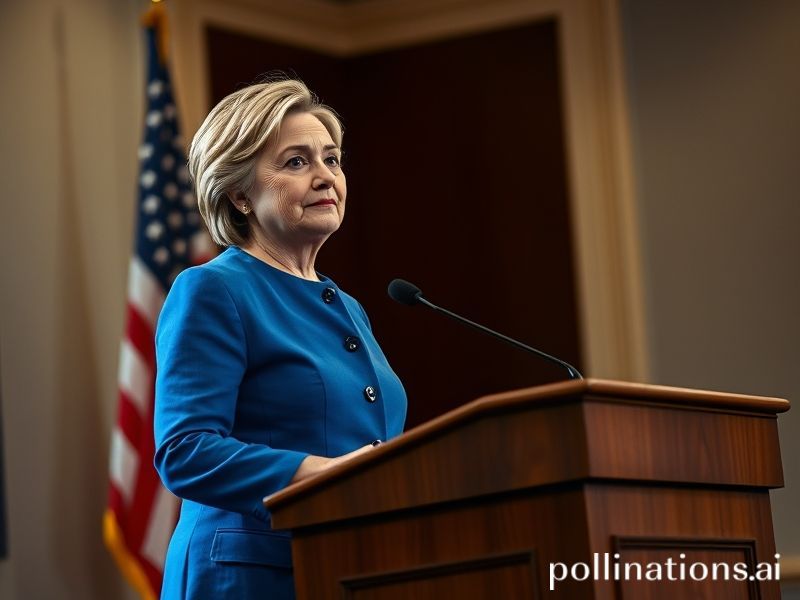hillary clinton
Global Gladiator: Hillary Clinton and the Art of Never Leaving the Arena
By Dave’s Locker, International Desk
If nations were dinner guests, Hillary Rodham Clinton would be the one who keeps refilling her own wine glass while everyone else pretends not to notice the host’s desperate glances at the clock. Twenty-five years after the world first met her as the cerebral First Lady who dared to dabble in policy, she remains both an international Rorschach test and the planet’s longest-running political sequel nobody asked for but everyone reviews.
From the vantage point of, say, a smoky café in Sarajevo, Clinton is the ghost in the NATO machine. Locals still swap stories about her March 1996 visit—how she ducked sniper fire that, depending on which Sarajevan you buy rakija from, either whistled past her ear or was invented by jet-lagged aides. Myth-making aside, her presence certified Bosnia’s transition from “problematic headline” to “European Union aspirant with paperwork issues.” Brussels bureaucrats still quote her Balkan sound bites like scripture, proving that nothing unites a fractured continent faster than a shared memory of someone else’s trauma.
Slide eastward to Beijing, and the narrative warps like cheap plastic in the sun. Chinese state media long ago filed Clinton under “dangerous feminist with hegemonic tendencies,” a label that sells well in a country where gender equality is applauded in slogans and quietly sabotaged in boardrooms. When she tweeted support for Hong Kong protesters in 2019, the Global Times responded with a cartoon of Lady Liberty wearing combat boots—an image so melodramatic it could’ve been storyboarded by a teenage metal band. Yet beneath the outrage, Chinese diplomats privately concede that a Clinton in the Situation Room translated predictably into red-line memos and trade clauses they could at least negotiate, as opposed to the tweet-storm roulette of some successors.
Latin America, meanwhile, treats her like a telenovela villainess who refuses to exit stage left. In Honduras, schoolchildren learn that the 2009 coup happened “under Clinton’s watch” as Secretary of State, a pedagogical simplification that nourishes both leftist martyrdom and anti-gringo beach-bar rants. Whether she green-lit the ouster or merely overslept the moral alarm clock is a nuance drowned out by the louder need for a clear antagonist. Across the Andes, Argentine feminists wave “#StillWithHer” signs at abortion-rights rallies, repurposing her brand of pantsuit resilience for battles she never enlisted in—a global franchise of feminist merchandising where royalties are paid in retweets, not dollars.
Africa offers perhaps the most bittersweet encore. In Malawi, boda-boda drivers slap “Hillary 2024” stickers on their mud flaps as an ironic joke about term limits—because if America can flirt with political immortality, why can’t their own presidents? Nigerian podcasters dissect her leaked emails for coded messages on oil concessions the way medieval monks once hunted heresies in scripture. The joke, of course, is that the real influence lies less in any smoking-gun memo than in the IMF loan conditions drafted by technocrats who grew up quoting her 1995 “women’s rights are human rights” speech between sips of overpriced lattes.
Europe, exhausted by its own revolving-door crises, now views Clinton as geopolitical comfort food: not particularly nutritious, but familiar on a queasy stomach. German diplomats keep a well-thumbed copy of “Hard Choices” on the office shelf like a talisman against populist amnesia. French analysts use her 2016 defeat as a bedtime cautionary tale for centrist interns: “See, mes enfants, even résumés forged in Davos crucibles can be incinerated by 77,000 rust-belt voters.” The British, naturally, prefer the meta-irony—Brexit Britain lamenting American polarization is like the Titanic critiquing the Lusitania’s steering.
So what is the broader significance of this peripatetic political phoenix? Simply that in an age when most leaders exit pursued by indictments or irrelevance, Clinton has achieved the rare feat of becoming a permanent adjective. To be “Clintonian” internationally now means to survive scandal with PowerPoint precision, to wield gender as both shield and sword, and to embody the global elite’s conviction that experience is the best disinfectant—never mind the bacteria’s growing resistance.
The world doesn’t need Hillary Clinton anymore, which is precisely why it can’t quite quit her. She is the last guest lingering at history’s after-party, insisting—over clinking ice cubes and the smell of burnt canapés—that she’s just looking for her coat. Somewhere between Sarajevo’s sniper alleys and Beijing’s firewall, between Tegucigalpa’s textbooks and Berlin’s briefing books, the coat has become beside the point. The party, for better or worse, has moved into the street, and she’s still standing in the doorway, backlit, smiling that practiced smile. The rest of us—spectators, citizens, survivors—walk past her into whatever fresh chaos awaits, humming the campaign jingle we pretend we’ve forgotten.







